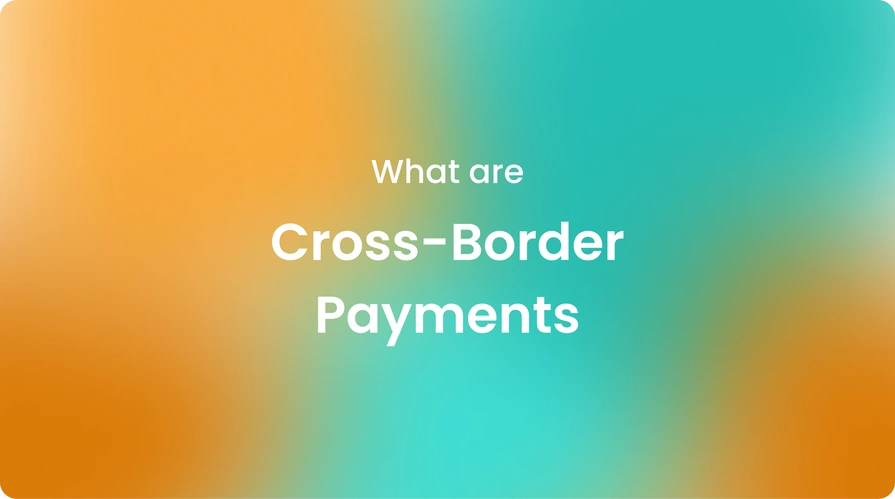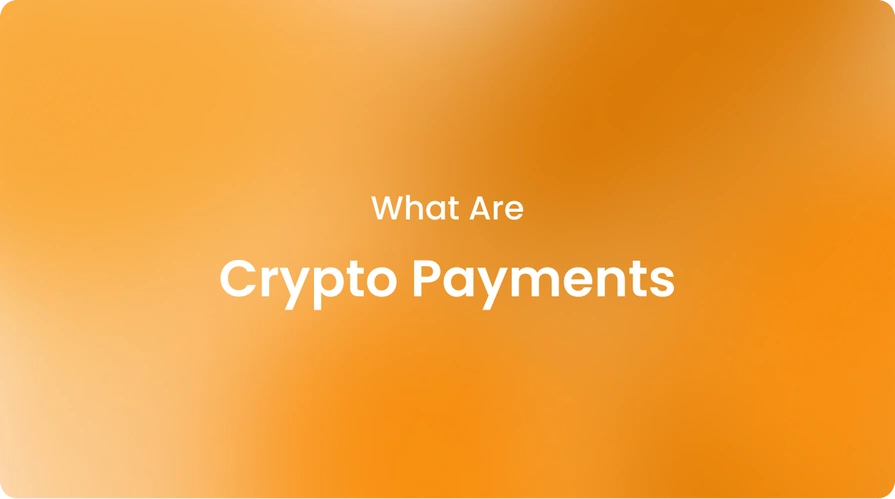|knowledgehub, crypto, stablecoins
What Are Cross-Border Payments?

As globalization has increased trade and commerce between nations, the need for efficient cross-border payment solutions has never been greater. Simply put, a cross-border payment refers to any transaction where money is sent or received across international borders.
Whether you're a large multinational corporation processing payments from customers around the world or an individual sending remittances to family abroad, cross-border payments underpin global economy activities.
Conventional international payment methods like bank wire transfers have significant downsides like high costs, complexity, and lack of speed; some transfers can take up to a week to clear.
Given that around 85% of the world's population does not have access to basic banking services, according to the World Bank, there is a massive global demand for more accessible cross-border payment solutions.
This is where new technologies like cryptocurrencies and stablecoins are poised to disrupt the status quo. Join us in this blog as we explore cross-border payments, the examples, the importance of using crypto for these types of transactions, and the benefits of EURK stablecoin for them!
How do cross-border payments work?
Traditionally, cross-border payments between nations are settled through correspondent banking networks. When a payment is initiated, the sending bank routes it through an international funds transfer system to a partner bank in the destination country.
That bank then credits the funds to the recipient's local bank account. New regulations from policymakers aim to provide consistent rules for all types of cross-border payment companiesoperating in the global marketplace.
However, these systems involve numerous intermediaries and often high fees, sometimes costing recipients up to 10% of the total amount in hidden charges.
They also operate during traditional business hours, so timing is critical. Furthermore, some countries lack strong correspondent banking relationships, creating barriers for remittances. The millions without bank access have even fewer options. Therefore, new ways to optimize them are crucial.
What are examples of cross-border payments?
Some common examples of cross-border payments include:
- International merchants process credit card payments from customers worldwide through payment gateways.
- Multinational corporations transfer funds between subsidiaries in different countries for payroll, procurement, etc.
- Individuals send money abroad as remittances to support friends and family through services like Western Union.
- Governments disbursing foreign aid and welfare payments across borders.
- Nonprofits are fundraising and transferring donations globally for humanitarian crises.
What is a cross-border payment for B2B?
For businesses engaged in international trade, efficient B2B cross-border payments are crucial. Whether buying from overseas suppliers or collecting revenue from foreign clients, complexities arise.
Traditional wire transfers saddle companies with high fees and problems like volatile FX rates, restrictive cutoff times, and a lack of payment tracking visibility.
Cryptobunq offers crypto payment solutions tailored for cross-border B2B transactions through its stablecoin EURK and other cryptocurrency exchanges that resolve many of these pain points affordably and quickly.
By integrating with Cryptobunq's crypto exchange APIs, businesses gain tools to streamline international payments on a single network. The transparency of blockchain technology also increases payment security compared to opaque wire systems.
What is the difference between cross-border payments and international payments?
While often used interchangeably, there is a subtle difference between cross-border payments and international payments. All cross-border payments are inherently international since they span multiple countries. However, not all international payments cross borders in the strict sense.
For example, transactions between banks within a currency union like the Eurozone involve correspondent banking but don't physically transport funds across borders.
Cross-border payments, on the other hand, always move money across legal and jurisdictional boundaries, whether sending USD from the US to Mexico or wiring euros from France to Germany. Their regulatory treatment also differs slightly due to foreign exchange and import/export considerations.
Why are cross-border transactions important?
With people, goods, capital, and data all flowing increasingly freely around the world, efficient cross-border transaction infrastructure is essential for globalization. Apart from enabling international crypto trading and crypto investment, cross-border flows generate specific benefits.
Here are the key points about cross-border payments:
Foster global commerce
Lower transfer costs boost imports and exports, which expand market access.
Drive economic growth
Fast remittances fuel consumer spending in developing nations, which lifts whole communities out of poverty.
Stimulate tourism
Easy money transfers support the trillion-dollar cross-border travel industry.
Fund global projects
Affordable transactions allow donations to benefit social and environmental initiatives worldwide.
Support immigrants
Secure payment rails give migrant workers the freedom to financially assist loved ones abroad.
How fast are cross-border payments?
Quick settlement times are crucial for cross-border payments due to fluctuating FX rates and time sensitivity in international commerce. While traditional wire transfers from major banks can take 3-5 business days for clearance, newer fintech solutions deliver notable speed boosts.
Here are some of them:
ACH transfer
ACH transfer takes 1-3 business days (USA); instantly for same-bank transfers.
SWIFT network
SWIFT takes 1-2 business days for basic international wires.
Cryptocurrencies
Cryptocurrencies and stablecoins take minutes to hours, depending on blockchain, despite 24/7 availability globally without borders.
Cryptobunq's stablecoin EURK settles in just a few minutes on Ethereum via smart contracts while maintaining a 1:1 EUR price peg for maximum payment certainty. This speed transforms foreign exchange logistics.
What cryptocurrencies are used for cross-border payments?
As digital currencies native to the internet, cryptocurrencies show promise to address long-standing cross-border payment pain points through their decentralized networks.
Popular cryptocurrencies used for cross-border payments:
Bitcoin
Being the original and first cryptocurrency, Bitcoin has achieved widespread global awareness, which has spurred innovations like Cryptobunq, which enable merchants to accept crypto payments instantly from anywhere for a nominal fee.
Ethereum
The second-largest cryptocurrency underpins many other coins and has protocols for stable value transfers through coins like EURK issued on its blockchain.
EURK by Cryptobunq
A euro stablecoin is securely backed by real bank deposits and audited quarterly, offering swift EUR-denominated payments worldwide for a fraction of wire costs.
Why choose EURK as a stablecoin?
Global commerce demands reliable payment tools, yet conventional methods fail far too many around the world. This is where the EURK stablecoin from Cryptobunq truly shines for cross-border transactions.
As the expert regulated digital asset custodian, Cryptobunq issues EURK fully backed by fiat reserves for price stability. Its hybrid architecture combines public blockchain transparency with private crypto custody security, giving businesses and consumers the best of both worlds.
With compliance built-in and instant low-cost settlement worldwide, EURK eliminates the barriers hindering global trade for billions without bank access. You can easily buy EURK through CBQ.
Integrating with Cryptobunq crypto APIs also ensures future-proof payments against ongoing economic uncertainty and geopolitical risks that threaten traditional wire systems. Overall, EURK paves the way for an accessible, inclusive future of global value transfers, empowering all with the support of CBQ.
The bottom line
In today's digital world, driven by constant global connectivity, legacy cross-border payment methods struggle to keep pace.
New fintech solution providers like Cryptobunq are innovating with stablecoins to streamline international commerce in a manner that is compliant, cost-effective, and inclusive for everyone on the planet.
Reliable stablecoins such as EURK present immense promise to uplift billions still experiencing the hardships of slow, expensive transfers or lack of access altogether.
By acting as universal payment networks bridging both crypto and traditional finance, companies including Cryptobunq are pioneering the transformation underway.
Though adoption challenges remain, firms integrating Cryptobunq's crypto services are well-positioned to gain competitive advantages, facilitating the thriving global trade of tomorrow with next-gen payment rails.
Contact us and start to explore our innovative one-stop-shop crypto service solutions for your business, from custody and wallet to tokenization. Adapt to the future and benefit from easy, fast, and secure cross-border payments with CBQ!













